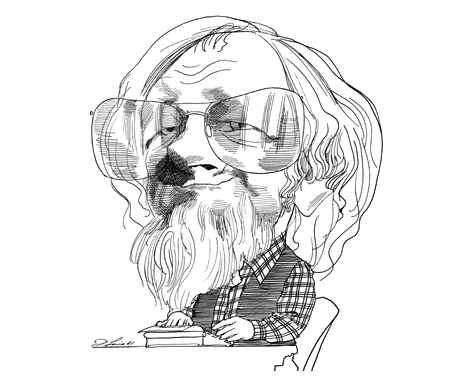
In Dave Eggers' extraordinary introduction to Barthelme's Forty Stories he writes down a pretty brilliant insight, one I've often found cropping up in myself when going through Don B's electrifying canon. He writes: "I had a tough time reading this book this time around, because it's one of the few collections that inspires me to the degree that every sentence I read makes me want to stop and write something of my own. He fires all my synapses and connects them in new ways. He sends a herd of wildebeest through my mind. It's a whole jungle full of animals, really, every color and shape, and he sends them all over my brain, screaming, defecating, fornicating."
Barthelme's fiction brims with possibilities, overflows with them. It is rebellious, defiant, inviting, hysterical, absurd, sad, life-affirming, and always moving. In every story--every sentence, every word--he demonstrates with aplomb what can be done within the framework of fiction, how much room there is for exploration of the form, how limitless and how kinetic it is, taking the question "What is a story?" and--rather than blowing it out of the water--he decides to drown it there instead, bloodlessly getting rid of such an outrageous question. "What is a story?" What is a human being? We shouldn't accept cookie-cutter answers to these complex questions, which demand multiple formulations and variations.
Sadly, Eggers also hits on another precision of thought, this one more disheartening, regarding the current state of the publishing industry. He begins the introduction asking a question: What would become of Donald Barthelme if he were to happen today, "if he were to burst onto the scene in 2004 or 2005 or thereabouts...what kind of reception would he receive?"
His short answer is clownish yet bitingly true: "People would be curious. Then they would probably be more or less dismissive. They might even club him in the street, using clubs meant for seals." His elaborative answer is less frolicsome, even more true: "We live in serious times, and though this is not Donald Barthelme's fault, he would pay dearly for it. The fact is that work like Don B's--which is playful, subtle, beautiful, and more like poetry (in its perfect ambivalence toward narrative) than almost any prose we have--would be seen today as frivolous, as unserious. There is in most quarters of mainstream fiction a newspapering process going on, wherein stylistic deviations are disallowed, where innovations in style are seen as a sign of disengagement. When reading contemporary work with distinctive styles, some readers become impatient and most critics become enraged. Tell us the story, they say. Just tell it to us, get it across, and get it over with. Spare us the frills."
Remember that Don B was, in his time, published in the some of the biggest of the big literary magazines. Today, the likelihood of that happening is suspect. Barthelme might have indeed found a publisher today, but would it be as robustly mainstream as it was then? Unlikely. Once again, Eggers, who was just on fire in this intro: "Things are different in this century, thus far. There is not much time for things that don't announce themselves and make fairly clear linear sense. And how often did Barthelme make clear linear sense? How often did his stories have a beginning, middle, and end? How often did he tell a story in a goddamn simple and easy way? Maybe once or twice, when he forgot himself."
Reading Barthelme is fraught with difficulties--but not the difficulties one would expect after reading all this--because, quite like Eggers, sometimes I just want to read Barthelme and not constantly feel the need to do writing of my own. Bathelme makes me want to write and write. Every sentence of his, the elasticity, the quantum leap of them, makes me want to write three or four or ten thousand of my own. But as far as distractions go, that's got to be one of the most welcome. Barthelme is the kind of reading experience that reminds one why we read--and why we write--in the first place: not simply to replicate or recapture experience, but to redefine it, to irradiate it.
No comments:
Post a Comment